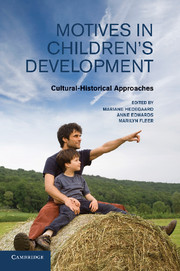Book contents
- Frontmatter
- Contents
- Figures
- Introduction
- Part One Motives, Emotions and Development
- Part Two Cultural Practice Motives and Development
- 5 The Development of Motives in Children’s Play
- 6 Developing Motivation through Peer Interaction
- 7 Developing Social Identities and Motives in School Transitions
- 8 Motives Matter
- 9 Motivation for School Learning
- Part Three Creating Conditions for Children’s Engagement
- Index
- References
9 - Motivation for School Learning
Enhancing the Meaningfulness of Learning in Communities of Learners
from Part Two - Cultural Practice Motives and Development
Published online by Cambridge University Press: 05 November 2011
- Frontmatter
- Contents
- Figures
- Introduction
- Part One Motives, Emotions and Development
- Part Two Cultural Practice Motives and Development
- 5 The Development of Motives in Children’s Play
- 6 Developing Motivation through Peer Interaction
- 7 Developing Social Identities and Motives in School Transitions
- 8 Motives Matter
- 9 Motivation for School Learning
- Part Three Creating Conditions for Children’s Engagement
- Index
- References
Summary
Introduction: School and Motivation
Teachers, especially in secondary education, report student motivation for learning to be their biggest problem (e.g. Del Río & Álvarez, 2002). This problem has, of course, long been present, but seems to have become more pressing over the last twenty years or so. Several changes in society may be identified as contributing to this development. The importance of school as a place for the acquisition of knowledge has gradually diminished since printed media became widely accessible, but the advent of Internet has accelerated the perceived function loss. The relevance of school has become unclear to students, whereas its socialisation function, given form as the ‘transmission’ of values and norms, is something young people have long been sceptical about, if not resistant towards.
A cultural-historical understanding of motivation and the associated problems in school is quite different from the two ideas that have dominated educational thinking on this subject: (1) that adequate teaching procedures will take care of motivation problems (see e.g. Thorndike, 1913; Oelkers, 1998), and (2) that motivation is part of the meta-cognitive skills a student needs to develop in order to be able to study properly (see e.g. Boekaerts & Cascallar, 2006). Cultural-historical theory, on the other hand (e.g. Davydov, 1999; Engeström, 1987; Fichtner, 1985; Lompscher, 1999; Lompscher & Hedegaard, 1999), interprets motivation as rooted in the dialectical relation between student and educational activity. Motivation may be understood as arising from the personal subjective meaning a student can attach to participating in the activity of school-going in the form that it takes at a given moment. Motivation in this sense is not the rather short-lived kind engendered by the experience of something unexpected, as when the chemistry teacher performs an experiment that ends with a bang. Nor is it the same thing as ‘having a good time’ in school, when that good time does not also challenge students to take a next step in their development. Motivation for school learning is, from this point of view, directly related to meaningful learning.
- Type
- Chapter
- Information
- Motives in Children's DevelopmentCultural-Historical Approaches, pp. 153 - 170Publisher: Cambridge University PressPrint publication year: 2011
References
- 3
- Cited by

